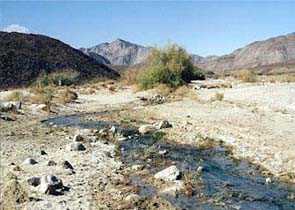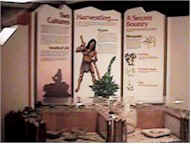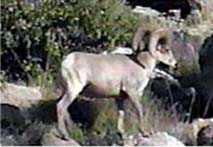 Just two years before the signing of our Declaration of Independence this
huge wilderness desert amphitheater was first glimpsed by Juan Bautista de Anza, colonizer
of San Francisco. He led the first overland journey between Sonora and the Pacific
littoral bordering the Sierra Madre. His route lay across the Imperial Valley, through the
Borrego, and into the mountain regions by way of Coyote Creek. For nearly a century and a
half after desert winds had obliterated the tracks of Anza and his followers, the Borrego
Valley was a forgotten land. Except for the few Indians who eked out a primitive existence
around the few springs and wells in adjacent canyons, the valley was avoided by
travelers.A visitor to Borrego Valley will find much of interest along the route that
leads from the wooded heights of a mountain range to the desert's floor. A gradual
transition from the sub-Alpine through the upper Sonoran zones discloses an amazing
variety of trees, plants, and shrubs which have found the exact conditions necessary to
their existence. A few feet of elevation more or less, and there is climatic change which
places a barrier against encroachment by one species, and reserves a place for another. Just two years before the signing of our Declaration of Independence this
huge wilderness desert amphitheater was first glimpsed by Juan Bautista de Anza, colonizer
of San Francisco. He led the first overland journey between Sonora and the Pacific
littoral bordering the Sierra Madre. His route lay across the Imperial Valley, through the
Borrego, and into the mountain regions by way of Coyote Creek. For nearly a century and a
half after desert winds had obliterated the tracks of Anza and his followers, the Borrego
Valley was a forgotten land. Except for the few Indians who eked out a primitive existence
around the few springs and wells in adjacent canyons, the valley was avoided by
travelers.A visitor to Borrego Valley will find much of interest along the route that
leads from the wooded heights of a mountain range to the desert's floor. A gradual
transition from the sub-Alpine through the upper Sonoran zones discloses an amazing
variety of trees, plants, and shrubs which have found the exact conditions necessary to
their existence. A few feet of elevation more or less, and there is climatic change which
places a barrier against encroachment by one species, and reserves a place for another.
To the west, San Ysidro mountain forms a veritable wall of granite, while the north is
bounded by Coyote Mountain, rising abruptly from the desert floor without the customary
alluvial slope. Against this Alpine background the gray floor of the desert, covered with
sage, cacti, and thorny mesquite, stretches away in alluring perspective. Late winter and
early spring finds those wide expanses clothed with myriad's of incense bush and a score
of other varieties that make the landscape a blaze of color. To the east, the Santa Rosas
form a natural barrier from the tropical storms coming up from Mexico during the hurricane
season. Entering Borrego Palm Canyon, a splash of green is discerned against the
gray rock wall ahead. Drawing closer, one can distinguish individual palms, with slender
trunks surmounted by plume-like fronds. Snaking its way around huge boulders, the path
enters the grove, and one finds himself in a veritable lost world. In the dense shade are
crystal pools of water from hidden springs.

ANZA-BORREGO DESERT STATE PARK®
Visitor Center phone: 760.767.4205
Park Headquarters phone: 760.767.5311
Reservations: 1.800.444.7275
Wildflower Hotline call: 760.767.4684 or visit DesertUSA.
Encompassing over 600,000 acres, the Anza-Borrego is the largest desert state park in the
United States. Dedicated to the preservation of this area of the Colorado segment of the
Sonoran desert the state park system provide for this and later generations a complete
picture of desert life. The Park offers many interpretive programs to the public at no
cost:
Naturalist's Talks Presentations by Volunteer Naturalists take place at
the Visitor Center. Each volunteer brings special skills and interests to the program, so
each is unique. Fossil Programs Join a volunteer from our paleontology
group to learn about the mammoths, saber-tooth cats and other life forms that called Anza-
Borrego home in the past. Garden Walks Discover the unique
lifestyles of desert plants in the outdoor Visitor Center gardens which have
representative plants from all areas of the park. Nature Walks Led
by park staff or volunteers, a nature walk offers an easy (approx. 1/2) walk exploring
park natural features with a knowledgeable guide. Guided Hikes Join a
ranger or park Volunteer Naturalist for a longer walk which may cover some rocky, hilly,
or otherwise uneven terrain. Campfire Programs Presented by park staff
and volunteers, each program focuses on a different topic relevant to Anza-Borrego. The
Jr. Ranger Programs A special class for kids aged 7-12 only, Jr. Rangers provides
the opportunity for children to meet, have fun, learn about the park, and earn awards; a
state-wide program, participants are given a log book so they may keep track of programs
they attend throughout the year. Groups, Non-profit educational and youth organizations
may request an interpretive program presented exclusively to your group at the visitor
center.
BIGHORN SHEEP "The "borrego cimarrón" (as it was called by Spanish
explorers) lent its name to this park and we are dedicated to providing a lasting refuge for its
future. These are challenging times in the recovery of desert bighorn in California.
The State Park urges all concerned citizens to write a letter to your elected
representatives urging them to list the Peninsular bighorn as an endangered species. This
will help the park to protect them fully and acquire funds for support of bighorn-related
projects." to this park and we are dedicated to providing a lasting refuge for its
future. These are challenging times in the recovery of desert bighorn in California.
The State Park urges all concerned citizens to write a letter to your elected
representatives urging them to list the Peninsular bighorn as an endangered species. This
will help the park to protect them fully and acquire funds for support of bighorn-related
projects."
OPEN CAMPING POLICY - The Anza-Borrego is one of the few parks in California that permits
open camping. BACKCOUNTRY CAMPING - Along with the park's open camping policy, there are a
number of dry camps made available to the traveler. DEVELOPED CAMPING - Two developed
campgrounds are available in the park. Borrego Palm Canyon Campground, with 117 sites, is
located 2-1/2 miles west of Borrego Springs. Full hookups are offered along with large
tent sites, campfire center, nature trail and public telephones. Tamarisk Grove
Campground, located at Country Road S-3 and State Highway 78, has 27 sites for rigs up to
21 feet. Both campgrounds offer restrooms with day showers, shade ramadas and campfire
programs. GROUP CAMPING - five group campsites in Borrego Palm Canyon Campground offer
space for groups of 9 to 24 people each. All five sites can be reserved for up to 120
people. VERNON WHITAKER HORSE CAMP - For the equestrian camper or day user, the park has a
horse camp complete with 10 campsites, 40 corrals, and showers. RESERVATIONS are suggested
for camping in the developed, group, and horse camps from October to May. PARKNET IS
THE RESERVATIONS OUTLET WHICH HANDLES THE CALIFORNIA STATE PARKS, CALL 1.800.444.7275.
The Anza-Borrego Desert Natural History Association (ABDNHA) is a nonprofit corporation
dedicated to educational, interpretive, historical, and scientific endeavors in
Anza-Borrego Desert region. The association produces books, maps, and other aides to
understanding. They offer a Desert Lecture series that may include the Sonoran Desert,
historic routes through the park, eagles, mountain lions, etc.; support of walks, talks
and programs; and support of scientific research. Contact ABDNHA for publications and
membership information at 760.767.3052.
|